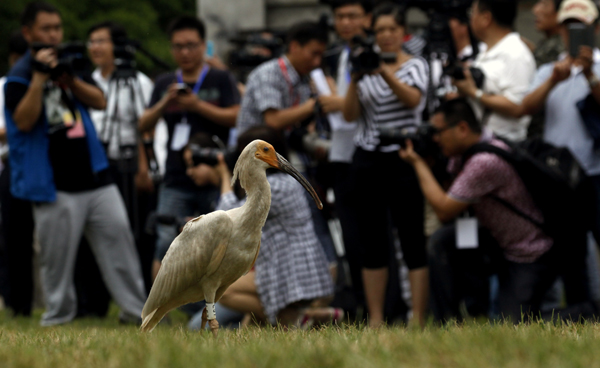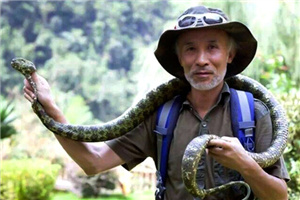32 endangered birds released into the wild
Thirty-two crested ibises were released on Wednesday from a protected enclosure to their natural habitat in the northern reach of the Qinling Mountains in Shaanxi province.
After a two-year experiment in Yangxian county, the rare birds, including 14 adults, 10 subadults and eight juvenile birds, are now able to survive in the wild, said Chang Xiuyun, a senior scientist with the Wildlife Conservation Center under the Shaanxi Forestry Administration.
 |
|
Photographers focus on a crested ibis before forestry officials release 32 of the endangered birds into the wild in Tongchuan, Shaanxi province, on Wednesday. |
The birds, which were found in Japan, China, Russia and the Korean Peninsula, were believed to be extinct in the early 20th century.
Great efforts have been put into protecting the birds since 1981, when seven crested ibis were accidentally found in Yangxian county.
Since then, the number of crested ibises in China has increased to more than 1,700, including more than 1,000 in the wild, and 700 in captivity, according to the State Forestry Administration.
"These artificially bred birds are all descendents of the seven that were found in 1981," said Chang. "Interbreeding of the birds can cause risks such as deformity or high mortality due to low genetic diversity, and these issues threaten the already small population."
"Our aim in sending them back to the wild is to help the birds adapt to natural living conditions, improve their species and enlarge their habitat," she said.
With an average height of 80 centimeters and weighing 1.8 kilograms, the white-feathered, red-faced bird typically lives in rice fields and feeds on aquatic insects.
Scientists have used six wireless trackers to monitor the birds during their adaptation in the wild.
"We can see whether the work we've done in the past 32 years is a success or failure, and we will learn from the outcome," said Yan Xun, an official with the administration.
However, Yan's co-worker Chang is now concerned about the birds' habitat and whether it can be protected.
"There is a natural conflict between economic development and ecological protection. As the government aims for economic growth, construction projects could have a negative effect on the birds' habitat," she said.
Hunting and massive use of pesticide is another concern. According to Yan, the police have informed residents to not hunt the birds or use massive fertilizers and pesticides in grain farming.
To make up for their economic losses, farmers can benefit from the provincial ecological compensation that also started this year, he said.




























